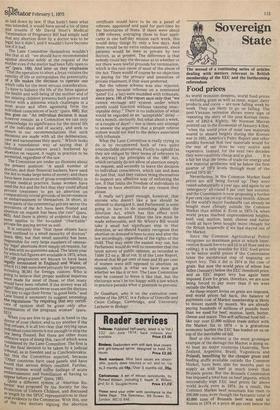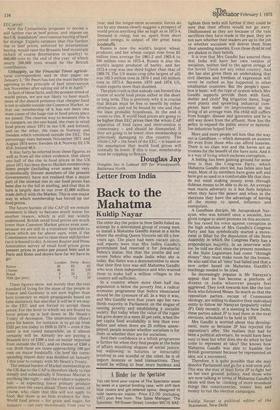Sovereign State
The second of a continuing series of articles dealing with matters relevant to British membership of the EEC and the forthcoming referendum
Food prices
As world recession deepens, world food prices — including grain as well as meat, sugar, dairy products and cocoa — are now falling week by week. They are likely to go on falling. The post-Vietnam recession shows every sign of repeating the story of the post-Korean recession of 1952-4. Rightly, Mr Norman Macrae , pointed out in the Economist of January 4 that, "when the world price of most raw materials soared to absurd heights during the Korean war in 1951, America's Paley Report and other pundits forecast that raw materials would for the rest of our lives be very scar'ce and expensive. Instead, for the next two decades they were relatively cheap and in glut. . . . It is a fair bet that the terms of trade for energy and raw material producers will be below the first quarter of 1974 levels through most of the period 1975-95."
Nevertheless, in the Common Market food prices are still being forced up. They were raised substantially a year ago, and again by an 'emergency' all-round 5 per cent last autumn; and the Commission is now proposing a further 9 per cent rise on top of this next month. Almost all the world's major foodstuffs can already be bought more cheaply outside the Common Market than within it. Even in 1973-74, when world prices reached unprecedented heights, beef, veal, mutton, lamb, cheese and butter could all have been bought more cheaply for the British housewife if we had stayed out of the Market.
Since the Common Agricultural Policy recognises no maximum price at which Intervention Boards have to sell (it is all floor and no ceiling), it is only possible for EEC food prices to be below world prices if the Commission takes the exceptional step of imposing an export levy. This it did in 1974 in the case of grain. But now the world price of wheat has fallen (January) below the EEC threshold price, and an EEC import levy has again been, imposed. Even for grain, therefore, we are now being forced to pay more than if we were outside the Market.
As these import levies on grain are imposed, and world prices fall back, the balance of payments cost of Market membership is likely to mount month by month. We are already paying hundreds of millions of pounds more than we need for beef, mutton, lamb, butter, cheese and maize. This self-inflicted food bill — like our over £1,000 million trade deficit with the Market Six in 1974 — is a gratuitous economic burden the EEC has loaded on us on top of the inevitable oil bill.
Beef at the moment is the most grotesque example of the damage the Market is doing us. At least six major countries (Australia, New Zealand, Argentina, Brazil, Yugoslavia and Poland), benefiting by the cheaper grass and 'feeding stuffs available outside the Common Market, have been able for months past to supply us with beef at much lower than Brussels prices. But the Brussels Commission has imposed a total ban on beef imports, which successfully kept EEC beef prices far above world levels even in 1974. As a result, the Common Market beef mountain has risen to 200,000 tons, even though the fantastic total of 85,000 tons of Brussels beef was sold to•
in 1974 at a price 40 per cent below the EEC price!
Now the Commission proposes to decree a still further rise in beef prices, and impose on the UK 'mandatory' intervention buying of beef for storage. Experts estimate that this further rise in beef prices, enforced by intervention buying, .would raise the Brussels beef mountain (which of course deteriorates in quality) to 800,000 tons by the end of this year, of which nearly 200,000 tons would be the British contribution.
Unhappily, as the Financial Times agricultural correspondent said in that paper on January 3, "Mr Peart has lost the main battle by agreeing to the principle of beef intervention last November after opting out of it in April."
In face of these facts, and the present trend of world prices, we are not likely to hear much more of the absurd pretence that cheaper food is not available outside the Common Market, or that our membership of it has not been one main cause of the huge rise in food prices since we joined. The clearest way to measure this is to compare, on the one hand, the rises in retail food prices since 1971 in the UK and Ireland, and on the other, the rises in Norway and Sweden which remained outside the EEC. The percentage rises between November 1971 and August 1974 were: Sweden 18.4; Norway 23; UK 43.6; Ireland 46.5. . It may fairly be inferred from these figures, as well as from all the other evidence, that about one half of the rise in food prices in the UK since 1971 has been due to Market membership.
Some people (including even some not very economically literate members of the present Government), have not realised that a major part of the internal rise in our food prices has been due to the fall in sterling, and that this in turn is largely due to our over £1,000 million trade deficit with the Market. This is one major way in which membership has forced up our food prices.
The future burden of the CAP (if we remain members) is likely to become much worse for another reason, which is still not . widely understood. British retail food prices are much lower than Common Market prices even now, because we are still in a transition upwards to prices which are far above ours, even if the Commission were not to raise them still further (as it is bound to do). A recent Reuter and Press Association survey of retail food prices gives present prices in pence per pound here and in Paris and Bonn and shows how far we have to go:
'London Paris Bonn Butter 26 63 63 Cheese 40 81 139 Bread 8 24 21 Milk (per pint) 5 7.2 10
These figures show, not merely that the real standard of living for the mass of the people in France and Germany is not now higher than here (contrary to much propaganda based on false statistics), but also that it will be if we stay in the EEC and are forced to accept these prices. For the level to which we are bound to force prices up is laid down in Mr Heath's Treaty of Accession. The intervention (floor) price for butter, for instance, is to go up from £552 per ton today to £930 in 1978 — even if the latter is not raised meanwhile, as it almost certainly will be. Already we are paying a Brussels levy of £300 a ton on butter imported from outside the EEC, and on cheese of £380 a ton. Both these are taxes approaching 100 per cent on major foodstuffs. On beef the corresponding import duty was doubled on January 1 this year to comply with Mr Heath's Treaty. The annual burden of Market membership on the UK due to the CAP is therefore likely to rise steeply and substantially if Norman Macrae is anything like right — and the evidence supports him — in expecting lower primary produce prices over the years ahead. There are some, of course, who claim that this will not apply to food. But there is no firm evidence for this. World food prices — for grain and sugar, for instance — can vary enormously from year to year; and the longer-term economic forces do not by any means clearly suggest a prospect of world prices anything like as high as in 1973-4. Demand is rising; but so, apart from short period swings, is output of the great basic foodstuffs.
Russia is now the world's largest wheat producer; and her wheat output rose from 63 million tons average for 1961-2 and 1965-6 to 108 million tons in 1973-4. Russia is also the world's largest producer of barley, and her 1973-4 crop was one third higher than that of 1969-70. The US maize crop (the largest of all) was 102.5 million tons in 1970-1 and 142 million tons in 1973-4. Between 1970 and 1974 US, maize exports more than doubled.
The plain truth is that nobody can foretell the course of world food prices either in the short or long term. This is precisely why it is crucial that Britain must be free to benefit by either alternative, and not be bound by one and that the least probable hypothesis. In the end it comes to this. If world food prices are going to be higher than EEC prices then the whole. CAP apparatus of food taxes and intervention is unnecessary — and should be dismantled. If they are going to be lower, then membership is grievously damaging to this country. The whole CAP — the heart of the EEC — is based on the assumption that world food prices will normally be lower. If this is true, membership must be crippling to Britain.
Douglas Jay is Labour MP for Wandsworth, Battersea North
Douglas Jay



































 Previous page
Previous page